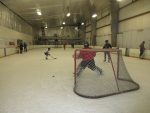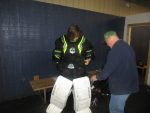Program Promotes a Very Special Kind of Ice Hockey

On a cold and clear Sunday, Max Maksimyadis arrives at the Brewster Ice Arena to prepare for a morning of hockey.
With the help of a friend, he goes through the ritual of strapping on his goalie equipment, something he’s done since childhood – chest protector, skates, goalie pads, mask, blocker and catching glove – before heading onto the ice.
“I saw how fun it was to just be out on the ice,” Maksimyadis said of his love for the sport. “It’s sort of like quiet. When you’re on the ice there’s nothing that can hold you back. I just fell in love with it when I was seven, eight years old.”
The Mount Kisco resident, who is the goalie for a squad which calls itself the Northern Bravehearts, never played in high school and he isn’t part of one of the many adult leagues in the region. Instead, Maksimyadis, 31, is a participant in a small but what he and others hope is a growing group of players in a hockey program for individuals with special needs. On the second Sunday of each month they gather at the Brewster Ice Arena and hit the frozen surface at 11:30 a.m. for a one-hour session.
Last month, about a half-dozen participants were on hand, including children as young as four years old. They joined Maksimyadis, who has cerebral palsy, and 21-year-old Jacob Weiner on the ice. Maksimyadis and Weiner are both veterans of the New York Raptors, a special-needs team that plays at Westchester Skating Academy in Elmsford. There were also two instructors, parents and siblings with hockey backgrounds to help out.
The fledgling team, established last year, has started slowly. Graham Smith, president of RSC Westchester, a nonprofit organization that provides a variety of activities for the local special-needs population and who is managing the program to help get it off the ground, said ice hockey is a challenge because of the need to learn to skate and the multiple skills involved.
But he sees a very hopeful sign; everybody in a core group of about seven or eight who started out has returned. He wants people, whether they are children or adults, to come, enjoy and stay.
“I don’t mind the pace of it,” Smith said. “It’s more ice learning rather than ice hockey.”
Ice hockey for those with disabilities isn’t new. The Bravehearts are currently one of 82 clubs that are members of the American Special Hockey Association (ASHA), said Jen O’Brien, its executive director. ASHA was established more than 25 years ago and has between 4,000 and 5,000 players on teams throughout the United States and Canada, she said.
O’Brien said anyone who has been diagnosed with a physical or developmental disability, from five years old through adulthood, is eligible to play. Participants are grouped not by age but by ability level, since some, like Maksimyadis, have been at it for years, she said. Some of the ASHA teams have two or three squads consisting of players of varying proficiency.
O’Brien said most programs like the Bravehearts start as a basic hockey skills clinic, where emphasis is placed on learning to skate for those who don’t know how. Many of the players involved are likely to be on the autism spectrum, have Down syndrome, cerebral palsy or ADD/ADHD, she said.
While the program is more therapeutic than competitive, as skill levels rise there are tournaments and regional events. No previous experience is necessary for anyone who wants to try.
“We don’t coddle the kids and they’re going to play,” O’Brien said. “They’re going to get out there and play and play hard.”
While activity and exercise are beneficial for anyone, Smith said learning how to skate offers enormous benefits for those with special needs.
“For balance and leg strength this is a fantastic challenge,” Smith said. “It’s also wonderful for focus. You have to be focused while you’re doing it. Balance and focus, because you can’t be unbalanced when you’re on the ice.”
There are other advantages for participants. Chappaqua resident Tony Napolitano said his youngest son, Max, who has delayed speech, is not only part of his own group but he can join his older brother, eight-year-old Victor, who plays youth hockey, on the ice. Victor was one of the family members who helped at the January session.
“It takes a lot of skill, a lot of practice, it’s a complicated sport, a lot of equipment also,” Napolitano said. “When you think about special needs kids, they don’t always look for something like that. They’re doing some basic activities, but like any team sport, the values that you learn are wonderful. It’s great for Max to see other kids with challenges and other issues and see how he’s fortunate in many ways, how other children are overcoming their limitations.”

Maksimyadis said that when he was seven years old his mother learned about the New York Raptors being established in Elmsford and asked him if he would like to try. It didn’t take much convincing.
“I really wanted to be on a team and then the next thing you know I was at the first skate of the New York Raptors,” said Maksimyadis, who works at Whole Foods in White Plains. “I’ve met a ton of people. My friends are all in the organization.”
Dan Donnelly has been bringing his 12-year-old daughter Deanna, who is autistic, to the monthly sessions. Since Donnelly coaches at the Brewster ice rink, a special education teacher in his home school district of Somers contacted him about the program.
Donnelly, a former goalie when he was young and whose younger daughter plays youth hockey, was intrigued and thought it would be good for Deanna. His wife is involved with the Somers Special Education PTA and they hope to get more youngsters involved and eventually see the Bravehearts grow.
“I think it’s a great idea,” Donnelly said. “There’s not a lot of programs, especially for ice hockey. (Deanna) plays roller hockey with the Special Olympics. This is a little different, ice is a little different. It’s an opportunity for these people to actually get out onto the ice, because a lot of people like hockey, and it’s a good way for them to get out on the ice and play the game they want to play.”
Smith said the Brewster Ice Arena has been helpful in finding ice time in the facility’s studio rink for the program. He hopes to build a strong foundation, and like the other participants, see the Bravehearts take off.
“You have to get the players and the players are really getting used to the ice first,” he said. “You don’t suddenly manufacture ice hockey players. It’s a process but the people here at this arena are absolutely fantastic.”
To learn more about the program, contact Graham Smith at 914-772-0864 or e-mail Grahams.rscinc@gmail.com.

Martin has more than 30 years experience covering local news in Westchester and Putnam counties, including a frequent focus on zoning and planning issues. He has been editor-in-chief of The Examiner since its inception in 2007. Read more from Martin’s editor-author bio here. Read Martin’s archived work here: https://www.theexaminernews.com/author/martin-wilbur2007/
